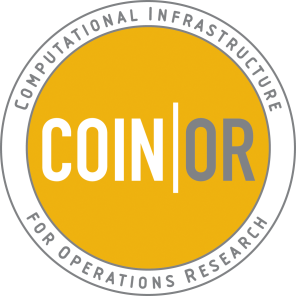A long, long time ago (1995 to be exact), INFORMS asked for volunteers to put together its website. While I was hesitant (I was an untenured assistant professor), I decided to apply, and I became the editor of INFORMS Online. There are few decisions that had such wide-ranging, and unforeseen, effects. I met people (like Brian Borchers, Matt Saltzman, and many others) who have been good friends and colleagues to this day. I worked with an amazing staff, many of whom (like my good friend Mary Magrogan) are still with INFORMS. And I learned a lot about how to distribute information to a large, distributed organization (getting significant information from the members would have to wait for later generations of web masters). Eventually I became President of INFORMS (for the year 2002) and Vice President for IFORS. And, it turned out, I eventually even got tenure. There are few decisions I have made that have changed my life so much.
One of my favorite organizations, COIN-OR, is looking for someone to help with their website issues. COIN-OR is a major force for open source resources in operations research. While I won’t guarantee it will change your life, I highly recommend getting involved in organizations like COIN-OR: you meet people, you learn a lot, and somehow, life seems to work out better when you are involved in things. Here is the announcement:
General overview:
The COIN-OR foundation is a non-profit foundation that hosts 50+ open source software projects. Currently, the Web site is hand-crafted HTML (www.coin-or.org). Pages are hosted in subversion and checked out from there. Pages describing individual project are rendered from XML (see, e.g.,https://projects.coin-or.org/SYMPHONY/browser/conf/projDesc.xml and http://www.coin-or.org/projects/SYMPHONY.xml). Project source code is hosted in subversion with TRAC providing an integrated wiki and bug tracking (see, e.g., https://projects.coin-or.org/SYMPHONY). A mailman list serve is used for support, user feedback, etc. (see http://list.coin-or.org/mailman/listinfo/). Individual projects get Web space in the form of pages checked our from subversion (see, e.g., https://projects.coin-or.org/SYMPHONY/browser/html and http://www.coin-or.org/SYMPHONY/index.htm)
The general idea is to give the site a complete makeover to give it a more modern look and feel, social media integration, Web *.* capabilities. We implemented a test site in WordPress to play with ideas.
Specific design goals:
1. Move site to a CMS that will allow easier maintenance, ability to grant edit permission to individual pages, ability to edit in the browser, etc. Currently, WordPress seems to do all we need and we are familiar with WordPress. We’re open to other suggestions, however.
2. With the move to CMS, upgrade look and feel of the site and add capabilities, as follows:
— Implement forums for support and user feedback. Should include the ability to have general high-level forums, as well as individual forums for each project. Users should be able to create accounts on the site and post to the forums. Forums should be moderated (or at least should have the ability to moderate.
— Upgrade TRAC to the latest version, integrate support for git, and integrate the look and feel into the overall Web site.
— Implement single sign-on for the Web site (forums), the TRAC site, subversion. and git (so far, the best solution for this seems to be OpenID). Support ability to require e-mail address for valid registration and to capture basic demographic information (again, OpenID seems the easiest option).
— Implement download form that asks downloaders to fill out a form with basic demographic information (possibly requiring some sort of account creation).
— Support the ability to auto-generate project information pages from XML templates checked out from the subversion repos of individual projects, as with current site.
— Support blog(s) for posting news items. Each project should have its own blog, but these individual blogs could be hosted on the sites of individual projects (see 3 below).
— Support an events calendar.
3. Support the creation of individual sites for each project using the same CMS (WordPress allows this).
4. Ideally, create a separate site for the foundation itself.
—
Dr. Ted Ralphs
Associate Professor, Lehigh University
(610) 628-1280
ted ‘at’ lehigh ‘dot’ edu
coral.ie.lehigh.edu/~ted
If you are interested, contact Ted: the COIN-OR group is a great group to work with!

 Do you use
Do you use